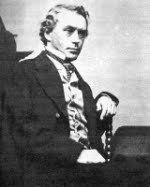I have already written a couple of times about the diary of George Templeton Strong but one more seems indicated. The diary really comes into its own in the days leading up to the Civil War and on through the war itself. Strong became involved in a volunteer group dedicated to providing medical supplies to the Army to compensate for the totally inadequate medical services the Army had available. He seems to have spent more time on that than on his law practice and it involved frequent trips to Washington and indeed to the Army in the field. Most of the time however he was in New York and attempting to follow the war as everyone else did by running out for the latest “extra” edition of a newspaper. In spite of the fact that first reports were often misleading or dead wrong, the result is a very realistic picture of what it was like to live through the war as a civilian. And when news came of Lee’s surrender and a week after that of Lincoln’s assassination Strong’s diary enables you to “be there” in a way that no history book can do. Here are two brief excerpts:
April 11, 1865 – Nine o’clock in the morning. LINCOLN AND SEWARD ASSASSINATED LAST NIGHT ! ! ! . . .
10 PM what a day it has been! Excitement and suspension of business even more general than on the 3rd instant. Tone of feeling very like that of four years ago when the news came of Sumter. This atrocity has invigorated national feeling in the same way, almost in the same degree. . . .. Above all, there is a profound, awe-stricken feeling that we are, as it were, in immediate presence of a fearful, gigantic crime, such as has not been committed in our day and can hardly be matched in history.
April 16. An Easter Sunday unlike any I have seen. Drove downtown very early with Ellie [his wife], Johnny, and Temple [their sons]. Nearly every building in Broadway and in all the side streets, as far as one could see, festooned lavishly with black and white muslin. Columns swathed in the same material. Rosettes pinned to window curtains. Flags at half mast and tied up with crepe. I hear that even in second and third class quarters, people who could afford to do no more have generally displayed a least a little twenty-five cent flag with a little scrap of crape annexed. Never was a public mourning more spontaneous and general. . . .
Trinity was never filled so full, not even last Tuesday. The crowd packed the aisles tight and even occupied the choir steps and the choir itself nearly to the chancel rails. The outer doors, by the by, were in mourning, and the flag and the spire edged in black pursuant to my suggestion yesterday. Within the church, the symbols of public sorrow properly gave place to those of Easter. When we came to the closing prayers of the litany, Vinton [assistant minister] proclaimed, “I bid you all unite with me in prayer for all the bereaved and afflicted families of this land, and especially for that of Abraham Lincoln, late president of the United States, recently destroyed by assassination,” and read the proper prayer for those in affliction. He then prefaced the usual prayer for a sick person by a like bidding “for the Secretary of State and the Assistant Secretary of State, now in peril of death from wounds inflicted on them by an assassin.” The effect of these formulas introduced into the service was telling. The anthem (Hallelujah chorus) represented the ecclesiastical aspect of the day and was admirably well done. The Vinton’s sermon, or rather address, was far the best I have heard him deliver; extemporaneous, as he told us afterwards, when Ellie asked him for a copy. He blended Easter sentiment with that of public grief most skillfully or I should say rather by presenting suggestions of deep-lying truths that harmonized them. He brought out clearly the thought that occurred to me and many others; perhaps Lincoln had done his appointed work; his honesty, sagacity, kindliness, and singleness of purpose that united the north and secured the suppression of rebellion. Perhaps the time has come for something besides kindness, mercy, and forbearance even for vengeance and judgment. Perhaps the murdered president’s magnanimity would have been circumvented and his generosity and goodness abused by rebel subtlety and falsehood to our lasting national injury. Perhaps God’s voice in this tragedy is “Well done, good and faithful servant. Thou hast done my work of mercy. To others is given the duty of vengeance. Thy murder will help teach them that duty. Enter thou, by a painless process of death, into the joy of the Lord.”
The whole service was a new experience to me. Men and women (poor Ellie among them) were sobbing and crying bitterly all around. My own eyes kept filling and the corners of my mouth would twitch now and then in spite of all I could do.